What You Need to Know About International Cargo Delivery
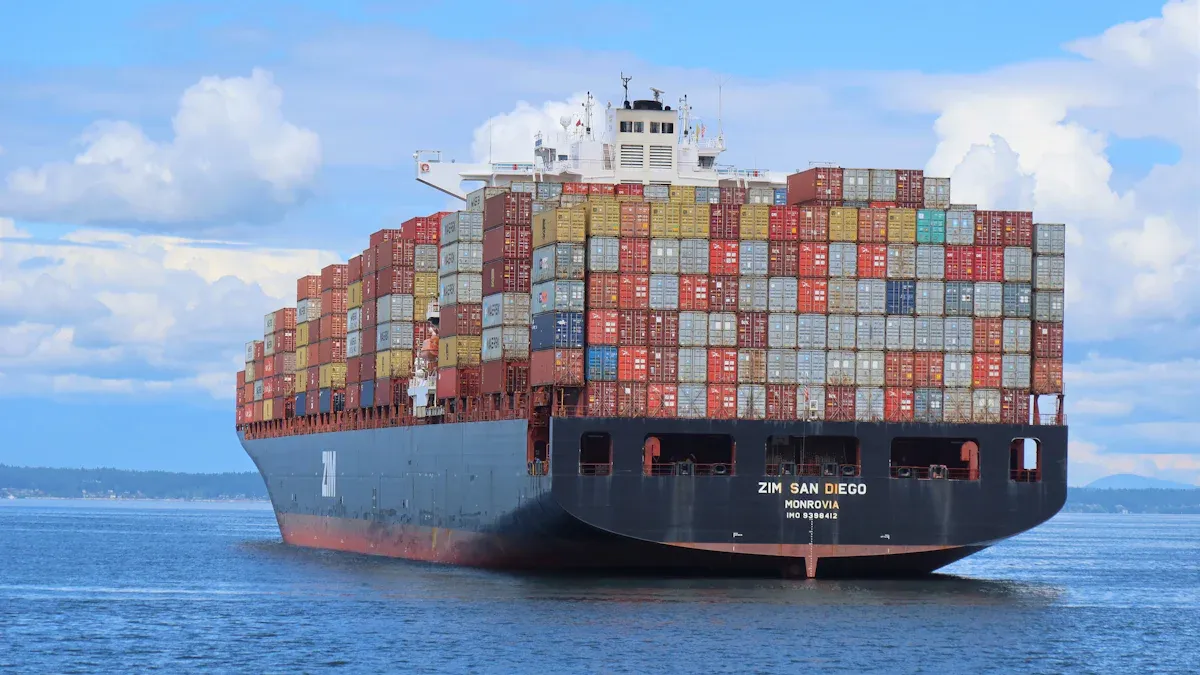
International cargo delivery helps your business reach people everywhere. You may have problems like confusing paperwork and customs taking too long. There are not many ways to ship, and rules can change often.
Get ready to follow strict rules and use new technology in shipping.
Pick a trusted partner like JUSDA to make sure your cargo delivery is easy and saves money.
Key Takeaways
International cargo delivery has many steps and strict rules. You need to prepare your documents with care. Pick trusted partners like JUSDA to save time and money.
Work closely with freight forwarders to help your shipment. Use different transport modes to handle customs and avoid delays. This also helps keep your goods safe during shipping.
Use technology like real-time tracking to watch your shipments. Digital tools help you manage costs and talk clearly with everyone. This makes delivery go smoothly.
What Is International Cargo Delivery
International cargo delivery is when goods move between countries. You can use planes, ships, trucks, or trains to do this. This helps your business send things to people in other countries. There are many steps you must follow. You need to pack your goods and fill out documents. You also have to book space with carriers. Your goods must pass customs checks. Shipping to another country is harder than shipping inside your own country. You must follow rules and fill out paperwork. You also need to keep your goods safe.
Key Differences from Domestic Shipping
There are some big differences between shipping in your country and shipping to other countries:
Domestic shipping is easier. One company can handle everything. Most things travel by truck.
International shipping has more rules. Customs and government agencies check your goods. You need more documents and must pass security checks.
Freight forwarders help a lot with international shipping. They plan routes and handle paperwork. They make sure you follow the law.
International shipping costs more and takes longer. Customs checks and long distances slow things down.
Tip: Always check your documents before you ship overseas. If you forget something, your goods may be delayed.
Main Players in Cargo Delivery
Many people and companies work together to ship goods between countries. Each one has a special job. Here is a table that shows what they do:
Stakeholder | Role Description |
|---|---|
Exporter | Sells goods to another country. |
Importer | Buys goods from another country. |
Freight Forwarder | Plans and manages shipping, paperwork, and logistics. |
Customs Agent | Checks goods at customs and collects taxes. |
Shipping Company | Owns the ships or planes that move goods. |
Shipping Agent | Helps the shipping company at ports and airports. |
Consolidator | Puts small shipments together in one container. |
Carrier | Moves goods from one place to another. |
Insurance Company | Protects your goods if something bad happens. |
Banks | Handles payments and letters of credit for shipping. |
You need to work with all these people to ship goods easily. Freight forwarders and carriers help you with the details and keep your goods safe.
Cargo Delivery Process
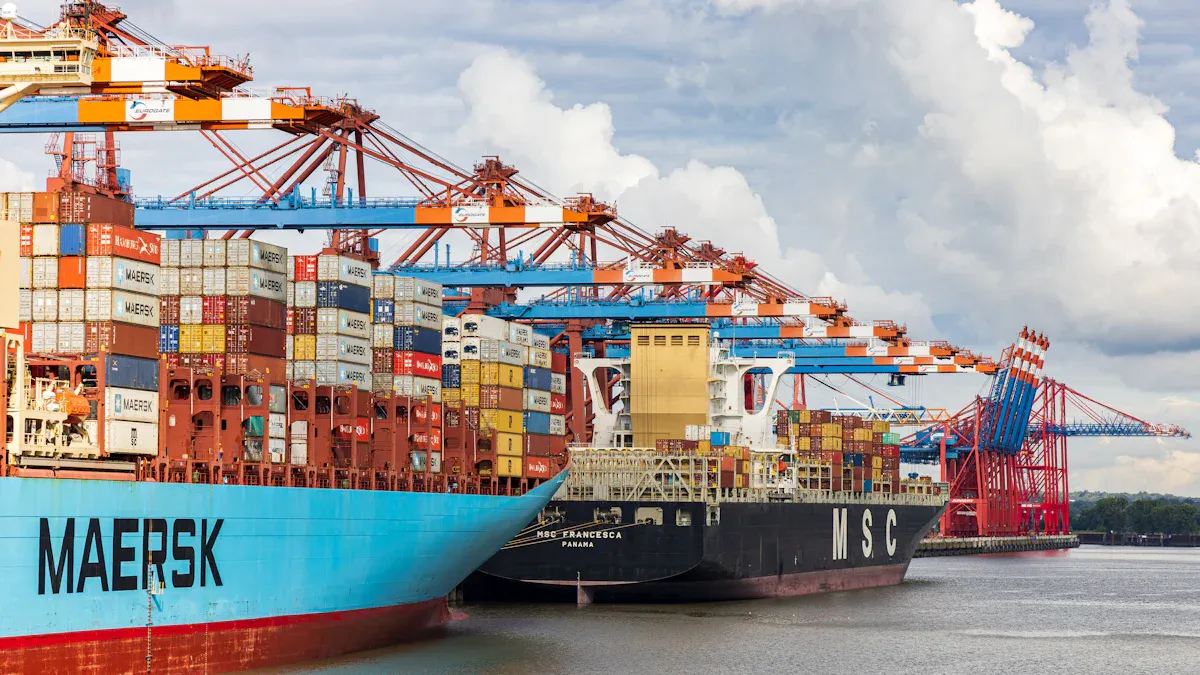
International cargo delivery has many important steps. You need to know each step. This helps your goods arrive safely and on time. Here is how the process works from beginning to end.
Export Haulage Steps
Export haulage is the first part of moving your freight. Your goods go from your warehouse or factory to a port, airport, or rail terminal. You usually work with a freight forwarding company for this. The forwarder helps you pick the best route and carrier. They also make sure your shipment follows all export rules.
Here is a simple list of the export haulage steps:
Get your goods ready for transport. Pack and label everything the right way.
Fill out a Shipper’s Letter of Instruction (SLI). This gives your freight forwarder the details they need.
Enter your shipment information in the Automated Export System (AES) if needed.
Collect export compliance certificates, especially for special or controlled items.
Get an inland bill of lading to show your freight was picked up.
For ocean shipping, get an ocean bill of lading. For air shipping, get an air waybill.
If you ship hazardous materials, fill out the right dangerous goods forms.
Tip: Always check your documents before your freight leaves. Missing paperwork can slow things down.
JUSDA’s freight forwarding team helps you with these steps. They arrange road, rail, air, and ocean transport. They match your shipment with the right carrier and route.
Customs Clearance
Customs clearance is a very important part of international shipping. Your freight must go through customs in both the sending and receiving countries. Customs officers look at your documents, check your goods, and collect any taxes.
Common customs clearance problems include:
Challenge | Description | Impact/Consequence | Suggested Solutions |
|---|---|---|---|
Incomplete or Incorrect Documentation | Missing or wrong paperwork like invoices or permits. | Shipment delays, fines, or rejection. | Use checklists, train staff, and hire customs brokers. |
Changing Regulations | Different rules in each country, often updated. | Fines, delays, or seizure of goods. | Stay updated, work with brokers, use customs management software. |
Tariffs and Duties | Misclassified goods or unexpected charges. | Higher costs, possible fines. | Use correct codes, consult experts, and check trade agreements. |
Delays in Clearance | Errors in documents or packaging issues. | Disrupted supply chain, extra costs. | Ensure accurate paperwork, proper packaging, and clear labels. |
Customs Audits | Incomplete records can trigger audits. | Penalties, extra duties, or delays. | Keep detailed records, do internal audits, and work with legal advisors. |
You can avoid most problems by having correct documents. Work with experienced freight forwarding partners. JUSDA’s customs clearance team helps you follow the rules and move faster.
Main Transport Modes
You have different ways to move your freight across borders. Each way has its own good points and costs. Here is a comparison:
Mode | Cost Characteristics | Transit Time Characteristics |
|---|---|---|
Ocean | Lowest cost per unit, ideal for large volumes and long distances | Slowest transit times (weeks) |
Road | Economical for short to medium distances, moderate cost | Moderate transit times (days), flexible door-to-door service |
Air | Highest cost per unit, suitable for urgent, high-value, or perishable goods | Fastest transit times (hours to days) |
Rail | Cost-effective for medium to long distances, especially bulk freight | Moderate transit times (days), reliable but limited network |
JUSDA offers all these transport modes. Their multimodal freight forwarding services use road, rail, air, and ocean shipping together. This gives you more choices and makes delivery more reliable. You can pick the best mix for your cargo. For example, you might use rail to take goods to a port, then use ocean shipping to send them overseas.
Note: Multimodal transport helps you deal with changes and problems. It also makes tracking and delivery times better.
Final Delivery
Final delivery, or import haulage, is the last step. Your freight goes from the port, airport, or rail terminal to the consignee’s place. You need to make sure everything is ready for a smooth handover.
Key steps for a good final delivery:
Check and organize all shipping documents, like the bill of lading, commercial invoice, and packing list.
Finish customs clearance and pay any taxes.
Talk with your freight forwarder, carrier, and consignee to plan delivery.
Follow all legal and contract rules. Make sure paperwork is right and complete.
Look at the goods at the final place before you accept them.
Take care of final checks and legal clearance.
JUSDA’s freight forwarding team handles last-mile delivery with their global network. They help you track your shipment and fix any problems.
Tip: Always check your freight before you sign for delivery. Tell someone right away if anything is damaged or missing.
International Shipping Documents
Essential Paperwork
When you send goods to another country, you need the right paperwork. These documents help your shipment move through each step. Here are the most important ones you should know:
Bill of Lading: This is a receipt and a contract with the carrier. It shows who owns the goods and where they go. There are straight and negotiable types.
Commercial Invoice: You use this to show what your goods are worth. Customs officers check this to figure out taxes and duties.
Packing List: This lists everything inside your shipment. It helps customs and your partners check the cargo.
Shipper’s Letter of Instructions (SLI): You give this to your freight forwarder. It tells them how to handle your shipment.
Customs Declaration Forms: Each country has its own form, like the U.S. CBP Form 7501 or the EU Single Administrative Document (SAD).
Safety Data Sheet (SDS): If you ship hazardous goods, you must include this. It explains how to handle and store dangerous items.
Tip: Always check your paperwork before you ship. If you miss something, you could have delays or get fined.
JUSDA’s team helps you get these documents ready. Their experts know how to avoid mistakes in international shipping paperwork.
Compliance and Regulations
You must follow strict rules when you ship goods to other countries. Each country has its own laws and requirements. Here are some things you need to watch for:
Use the right Harmonized System (HS) codes for your goods. Wrong codes can cause delays or penalties.
Make sure you have all needed licenses or permits, especially for restricted or controlled items.
Clearly mark identification numbers and codes on your shipment.
For ocean shipping, you may need a service contract with the carrier.
Give clear instructions for handling and storing your cargo.
If you ship hazardous materials, follow International Maritime Organization (IMO) Dangerous Goods Regulations.
Accurate and complete paperwork is very important. JUSDA’s customs clearance and trade compliance experts help you keep up with changing rules. They work with customs brokers and officials to make sure your international shipping meets all legal standards.
International Freight Shipment Challenges
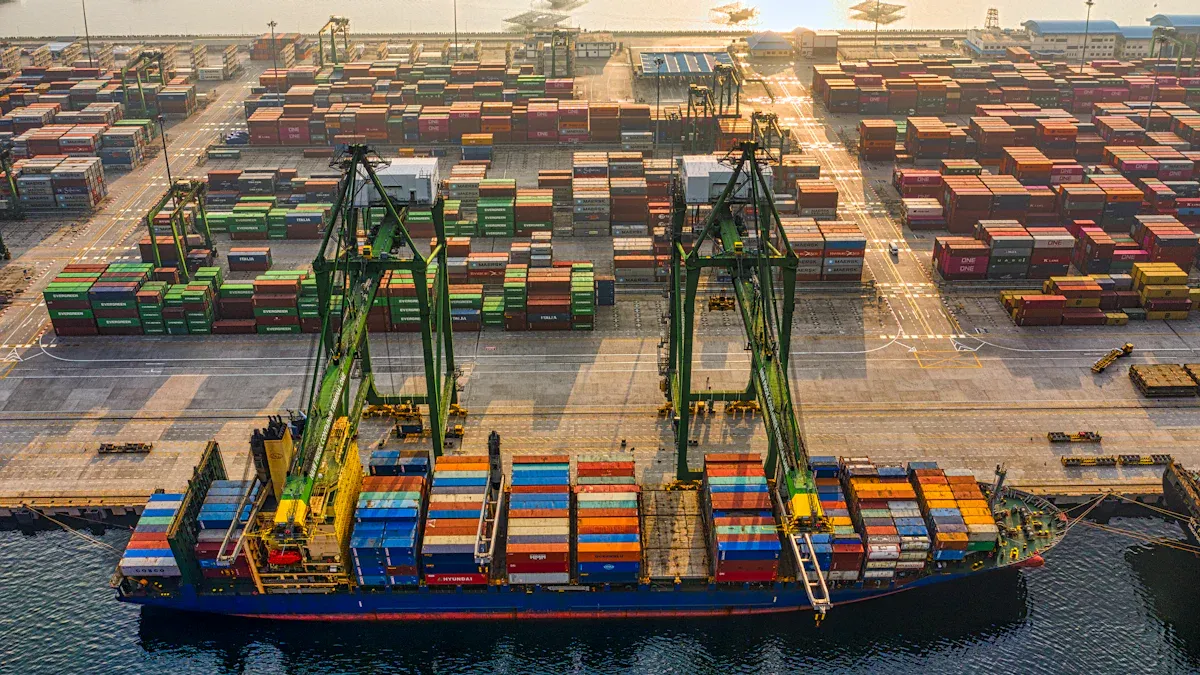
International freight shipment has many problems. You should know what might go wrong and how to fix it. The most common problems are late deliveries, damaged goods, and tracking issues. These problems can hurt your business. They can also slow down your supply chain.
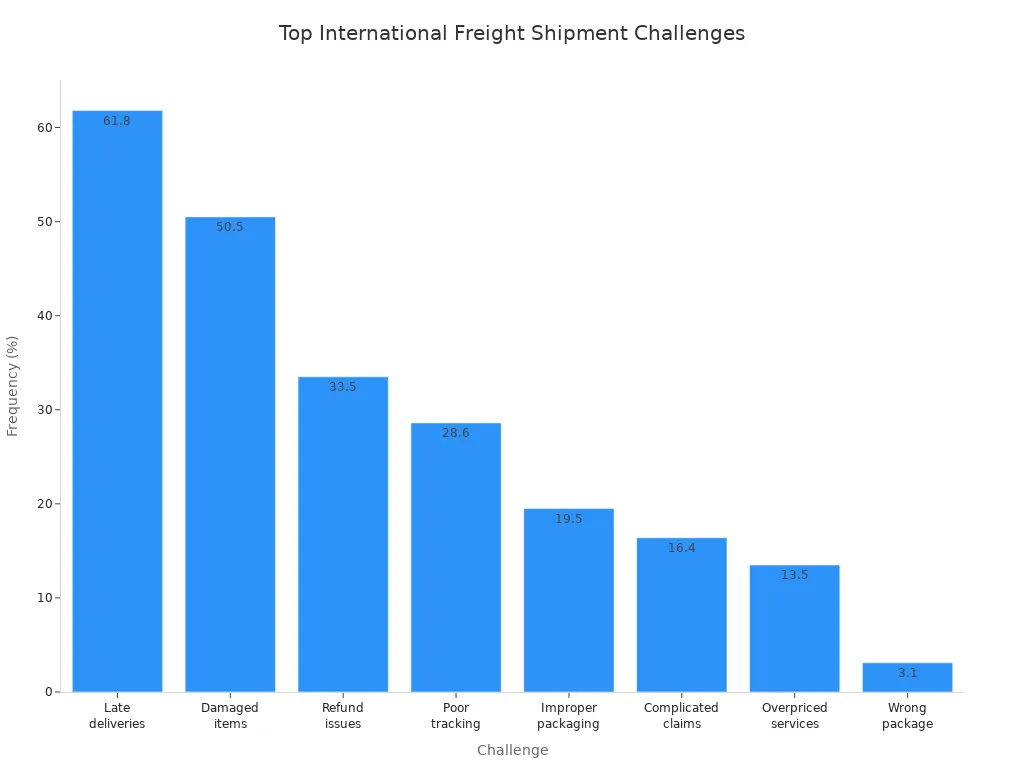
Delays and Solutions
Delays happen a lot in international freight shipment. You might have problems like:
Not enough containers or trucks for your freight
Customs checks or mistakes in paperwork
Busy ports or not enough workers
Bad weather or trouble in a country
Problems with last-mile delivery
You can stop delays by working with good freight forwarding partners. Use correct documents and track your freight in real time. JUSDA’s JusLink platform gives you live updates and helps you plan better. Sharp, a big electronics company, used JUSDA’s digital tools. They made delivery 30% faster and saved money.
Cost Management
Shipping costs can change fast. You can save money by:
Packing your goods better to pay less for shipping
Sending shipments together to lower costs
Picking the best way to move your freight
Not shipping during busy times
Using warehouses in other countries for faster delivery
Freight forwarding experts like JUSDA help you find the best routes. They help you manage costs. Their digital tools show all fees and let you track your shipment. This way, you do not get surprised by extra costs.
Importance of Accurate Information
Accurate information is very important in international freight shipment. If you make mistakes in your documents, customs may delay your freight. Wrong or missing data can mean fines and extra costs. Always check your paperwork and keep your records up to date. JUSDA’s digital freight forwarding system helps you avoid mistakes. It makes sure your shipping data is correct and matches every detail.
Accurate information keeps your freight moving and protects your business reputation.
Choosing a Logistics Partner
What to Look For
Picking the right logistics partner makes international freight delivery easier. You need a partner who knows your business and understands your freight. Here are some things you should check:
Expertise and Industry Knowledge: Pick a partner with experience moving your kind of freight. This helps stop mistakes and keeps your shipments safe.
Reliability and Track Record: Find a company that delivers freight on time and has good reviews.
Technology Capabilities: Your partner should use modern tracking systems. Real-time updates help you plan better.
Global Network and Reach: A big network helps your freight move across borders without problems.
Safety and Compliance: Make sure your partner has safety certificates and clear safety rules. This keeps your freight and business safe.
Customer Service: Good partners answer questions fast and help fix problems.
Transparent Pricing: You should always know what you pay for. Watch out for hidden fees in your freight bills.
Flexibility and Scalability: Your partner should handle more or less freight when you need it. They should offer solutions that fit your needs.
Note: The right partner helps you avoid delays, stops damage, and keeps freight costs low.
JUSDA’s 8 Core Products
JUSDA is a top choice for international freight delivery. You get a global network with over 155 service points and smart technology to track your freight. JUSDA’s 8 core products cover every part of the freight process:
Product | What It Does for Your Freight |
|---|---|
Air Transport | Fast delivery for urgent or high-value freight |
Land Transport | Reliable road freight for local and cross-border moves |
Ocean Shipping | Cost-effective for large or heavy freight |
Rail Transport | Efficient for long-distance and bulk freight |
Cloud Warehousing | Real-time inventory for your freight |
Consolidation & Distribution | Combines small freight shipments to save money |
Foreign Trade Services | Handles customs and trade compliance for your freight |
JusLink Intelligent Supply Chain | Gives you full visibility and control |
JUSDA’s team helps you choose the best way to move your freight. They help you manage costs and fix problems quickly. Their solutions work for many industries, like electronics and cars. This makes your freight delivery simple and reliable.
Best Practices for Smooth Cargo Delivery
Preparation and Communication
You can make shipping to other countries easier by following some easy steps. First, check all your papers. Make sure your commercial invoice, packing list, and bill of lading are right. Use a checklist so you do not forget anything. Pack your goods well and put clear labels on every box. This helps customs and your partners handle your shipment safely.
Here are some best ways to get ready and talk with others:
Learn the shipping rules for each country before you send goods.
Choose the best way to ship. Air is fast, ocean is cheaper for big loads, and road or rail is good for short trips.
Combine shipments when you can to save money and time.
Use strong packaging to keep your goods safe.
Get insurance for your shipment in case something goes wrong.
Stay in touch with your shipping partners. Share updates and fix problems fast.
Plan for delays and have backup plans ready.
Talking often with your partners and customers helps stop mistakes and delays.
Leveraging Technology
Technology makes shipping to other countries easier and safer. You can track your shipment in real time with platforms like JUSDA’s JusLink. This platform gives you updates about where your shipment is and how it is doing. It also helps you manage documents and talk to your partners.
Technology | Benefit |
|---|---|
Real-time Tracking | Know where your shipment is all the time |
AI Route Planning | Find the fastest and safest shipping path |
Cloud Platforms | Store and share shipping documents easily |
IoT Sensors | Watch temperature and security |
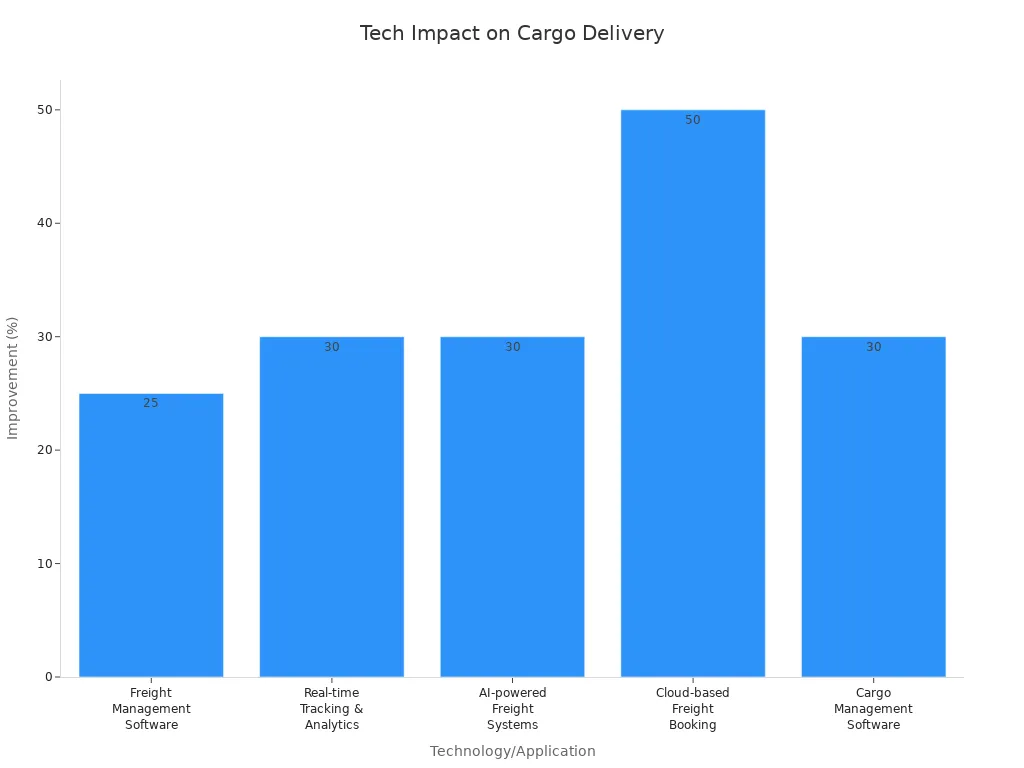
JUSDA’s JusLink platform uses these tools to give you full control over your shipment. You can find problems early and keep your shipping process smooth.

JUSDA Solutions
To provide you with professional solutions and quotations.
You can make your international cargo delivery better by doing these things: First, look at your shipping methods to find any problems. Next, use better routes and put shipments together when you can. Use smart software to do some tasks automatically. Choose the best packaging for your goods. Give updates to your customers often. Keep all your documents in digital form. Always learn from mistakes and ask experts like JUSDA for help. This will help your shipping go smoothly and be more reliable.
See Also
Comprehensive Insights Into Leading Global Logistics Providers
Discover The Latest Trends In Sea Freight Logistics 2024
Analyzing Emerging Trends In Logistics Risk Management
Top Reasons To Join The Best Logistics Webinars Today
How Artificial Intelligence Is Transforming Future Supply Chains
